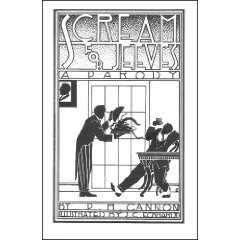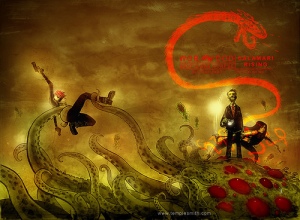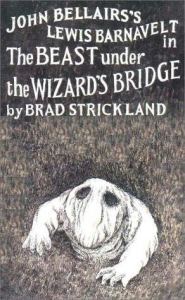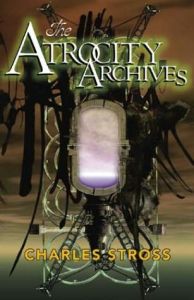
Scream for Jeeves
Reading Jess Nevins’ volume of annotations to Alan Moore and Kevin O’Neil’s Black Dossier, I came across a reference to a novel called Scream for Jeeves, in which the imperturbable valet created by P. G. Wodehouse battles cosmic monsters from the world of H. P. Lovecraft. Just the sort of thing to brighten up a winter afternoon, I thought. Alas, the book proved to be out of print and not to be had for love or money (or at least as much money as I was willing to part with). My disappointment did not last long, however. My recent reading has provided me with plenty of tentacled horror from beyond the stars.
I enjoy the art of Ben Templesmith, and not just because he was kind enough to do the jacket for my book. His art is the diametric opposite of the blandly drawn, high color value, computer rendered work on display in most contemporary comics. Ben’s paintings are full of murk and mildew, scratchy lines and turbid colors, busting forth into infrequent explosions of white-hot fire and crimson eyeballs. I like Ben’s work even better when he illustrates his own writing, and his deadpan humor and warped creativity are on full display.

Wormwood
Templesmith’s powers are shown to best advantage in Wormwood: Gentleman Corpse. The premise is simple. A corpse-possessing worm from an another dimension protects the Earth from demonic catastrophe. In the most recent volume, parasitic squid creatures attempt to “convert” every living thing on Earth. Templesmith has taken this Lovecraftian concept and twisted it into something almost unrecognizable, mixing in exotic dancers toting flamethrowers, the Apollo astronauts, rednecks with faerie wings, and Elvis. What would have been the major theme of a Lovecraft story becomes a mere chew-toy in the foaming jaws of Templesmith’s imagination.
Charles Stross treats Lovecraft’s legacy with a bit more reverence. I recently read his Atrocity Archives on the recommendation of Pseudopod’s Alasdair Stuart (a recommendation attached to the excellent New Weird story “Jihad over Innsmouth” by Edward Morris). The protagonist, Bob Howard, works for the Laundry, a covert intelligence agency sworn to protect the UK from extra-dimensional horrors. Bob is a math geek, a hacker who came to the notice of the Laundry after nearly summoning Nyarlathotep with his PC.
The books opens with Bob stumbling his way through a B&E at an industrial park, bent on destroying some dangerous computer files. In a scant two-hundred pages, the novel cranks up quite astonishing levels of terror, as Stross crossbreeds classic cosmic horror with cold war spy tropes and the all too human monsters responsible for the Nazi Holocaust. Before book’s end, Howard dons a pressure suit and follows a platoon of SAS commandos though a gate into a chill and airless world. He emerges greatly sobered, if not exactly mature. Atrocity Archives is paean to Lovecraft and Len Deighton combined with a nerd’s feast of speculative science and historical detail.

The Beast Under the Bridge
Even children’s authors are getting in on the act. Good horror fiction for young audiences can be hard to come by, but two of your best bets are John Bellairs and his literary inheritor Brad Strickland. While Bellairs was content to emulate Lovecraft’s tone of foreboding—his sense of all powerful, ever-present evil—Strickland has gone a step further. Where Bellairs invented his own menaces, Strickland borrows more directly from Lovecraft. In The Beast Under the Wizard’s Bridge, he even calls the Great Old Ones by name. (And we all know what a bad idea that is.)
Charles Stross has called the mythology created by Lovecraft the greatest open source shared world ever written. I wouldn’t have put it quite that way myself, but his observation is essentially true. As long as new authors read and love old stories, Lovecraft’s creatures will continue to find gainful employment. Frightening young boys with self-esteem issues. Plotting against coffee-addled hackers from covert government agencies. And yes, battling exotic dancers with flamethrowers.
Dave Hurwitz

